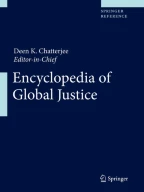
A response to the atrocities of the Second World War, the Universal Declaration of Human Rights (UDHR) was an attempt by the United Nations to promote peace, stability, freedom, and aminimally decent life for all human beings. Adopted by the General Assembly in December of 1948, it makes explicit general minimum obligations of states to citizens and citizens to their communities. No nation voted against the UDHR, but six actively abstained – the USSR, the Ukraine, Saudi Arabia, Byelorussia, Poland, Czechoslovakia, Yugoslavia, South Africa – and two were absent – El Salvador and Yemen. Though the declaration lacks the legal force of aratified treaty, it has effectively served as atouchstone for more specific and legally binding treaties and covenants, and has framed international politics since its inception. Thus, its impact on issues of global justice has been sweeping and undeniable.
The preamble of the UDHR recognizes that “the inherent dignity and the equal and inalienable.